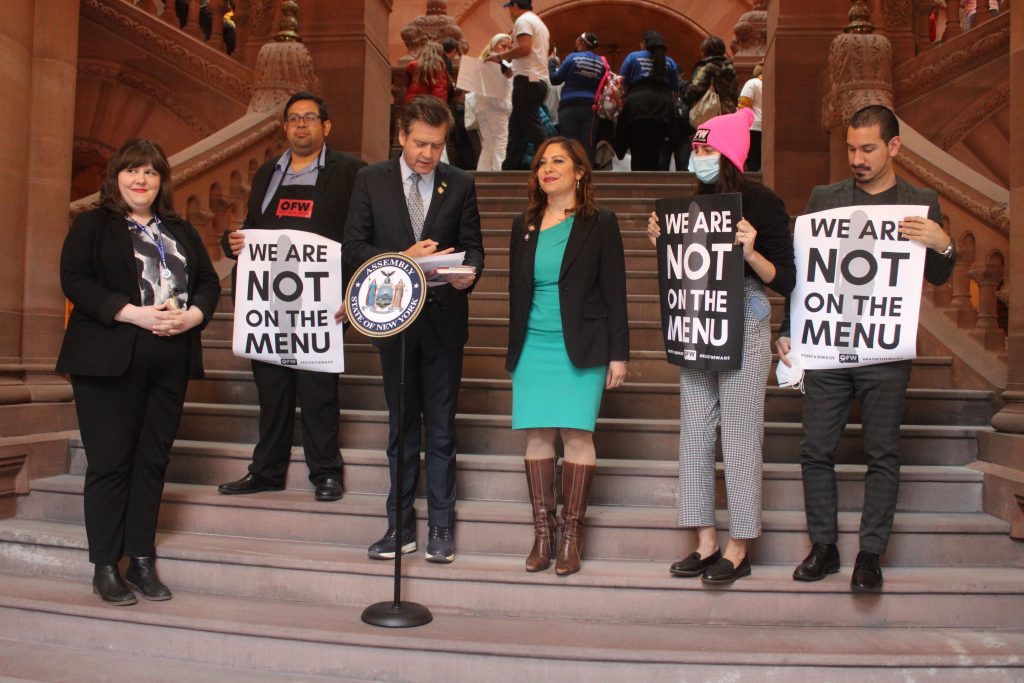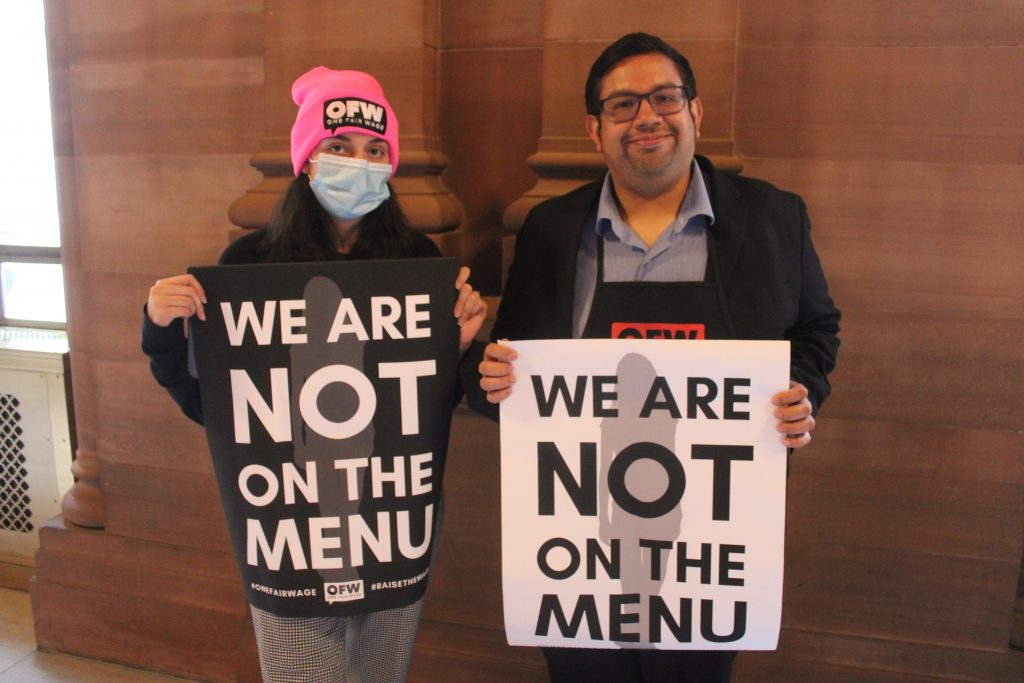
On March 9, 2022, on the Million Dollar Staircase in the State Capitol, Yamila Ruiz and other members of the One Fair Wage Coalition demand an increase in minimum wage for tipped workers with the support of legislators Jessica Gonzalez Rojas, Brad Hoylman and Emily Gallagher.
A coalition of tipped workers and state legislators are calling for a One Fair Wage policy in the state budget, which would guarantee a set minimum wage for restaurant servers and other tipped workers in the service industries.
On March 9, 2022, Senators Alessandra Biaggi and Brad Holyman and Assembly members Catalina Cruz and Jessica Gonzalez-Rojas met with a group of restaurant workers in the state Capitol to call for the passage of a bill (S.808 / A.2244) that would eliminate the sub-minimum wage for food service workers and others who work for tips.
According to the bill, employers would not be prohibited from allowing tips, but the gratuities would no longer make up the difference between wages received from the restaurant and the actual minimum wage.
Hoylman sponsors a bill (S.8386) that would created the Restaurant Recovery Fund, providing forgivable loans to those restaurants that pay a full minimum wage plus tips to their restaurant workers. That bill is sponsored in the Assembly by Gonzalez-Rojas.
The national organization One Fair Wage says this bill — sponsored by Sen. Biaggi and Assemblywoman Cruz — would help the restaurant industry by promising fair wages and attracting former employees back to the jobs that they had left during the “great resignation” over the past two years.
The bill also aims to increase the minimum wage of other tipped workers including nail technicians, car wash attendants, hairdressers, and others whose wages are often subsidized by tips alongside restaurant employees.
Employers of food service employees have been provided with a credit that reduces the hourly minimum wage paid to employees receiving tips. These employers now pay $7.50 per hour to workers, as long as the workers receive on average the difference between their wages and the statutory minimum wage in tips.
Eight states — Alaska, California, Maine, Minnesota, Montana, Nevada, Oregon, and Washington) have eliminated the tipped credit and required employers to pay the full minimum wage to employees. According to the bill memo, those states have seen growth in the restaurant industry and a more equitable and experienced workforce.
Yamila Ruiz, communications director for One Fair Wage, explained why the organization believes change is vital for the survival of the restaurant industry.
“New York state has the highest rate of restaurant worker exodus of any other state in the United States. It is double the national rate of exodus,” Ruiz said. “That means that workers are leaving more than any other place in this country.”
According to research conducted by One Fair Wage in accordance with the U.C. Berkeley Food Labor Research Center, one million workers in New York state have left their jobs in the restaurant industry since the beginning of the pandemic and another 53 percent are considering leaving.

Further research by the organization also found that out of the employees who have left, 70 percent say it is because of low wages and 90 percent say the only thing that could make them come back to work is a fully liveable wage with tips on top.
Ruiz also cites working conditions as a reason for many workers’ exits.
“Out of the one in ten workers who have left the industry nationally, one in five have left New York. All workers and women in particular are saying their tips have gone down. I know that it’s been a very slow couple of months for restaurants in New York and sexual harassment has gone way up since the pandemic began,” said Ruiz. “Thousands of women have been telling us that they have been experiencing rude customer comments saying things like ‘take down your mask so I know how much to tip you.’”
Assemblywoman Gonzales-Rojas believes that the issue is an intersectional one that affects many different people in marginalized communities.
“It is a worker justice issue, it is a gender justice issue, it is a racial justice issue and in communities like mine, it is an immigrant justice issue. We are coming out of black history month and we’re in women’s history month and we have to acknowledge the intersections of this fight,” Gonzalez-Rojas said.









